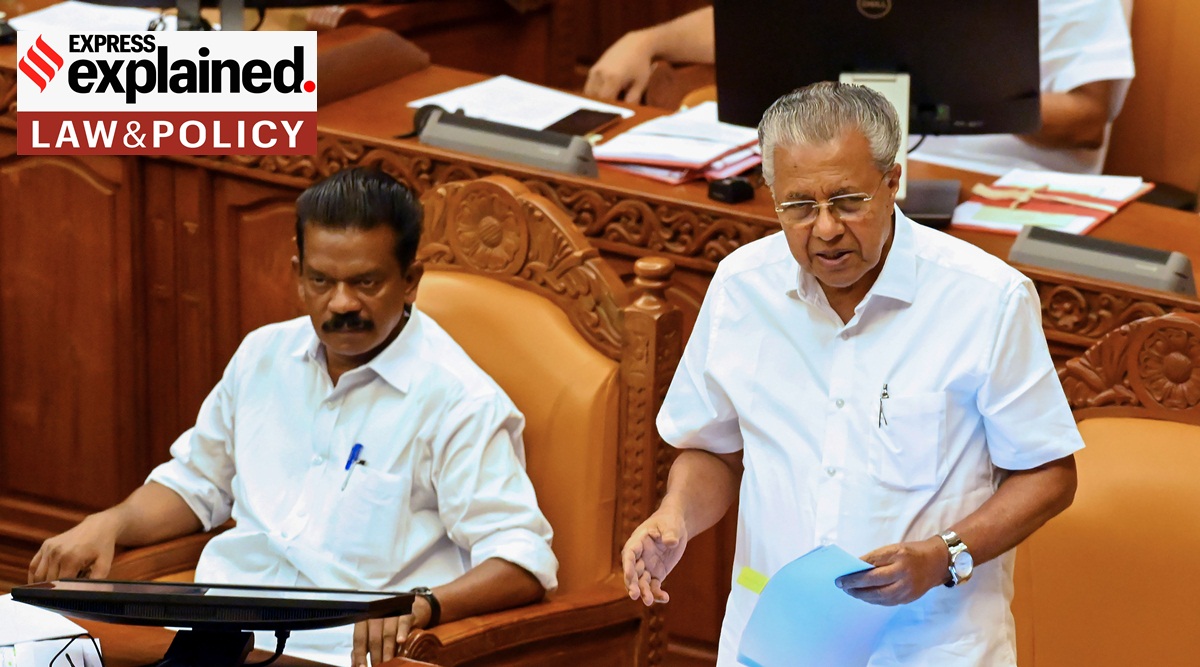The UCC is often painted as ‘one law for one nation’ but what powers do states have to make law on the issue?
The Kerala Assembly resolution essentially strikes a cautious note that a proposed UCC could harm the secular nature of the country. The resolution also talks about federalism – that the Centre could make a unilateral move on the contentious issue without consulting states.
“The Constitution refers to civil code only in its Directive Principles. It is critical to note that the Uniform Civil Code was limited to Directive Principles. Implementation of Directive Principles is not mandatory. The court may order to enforce Fundamental rights. But the Directive Principles of Article 44 of the Constitution cannot be enforced even by the courts. It is essential to understand how much thought the founders of the Constitution put into their decision,” the resolution stated.
Can the Centre make a law unilaterally on UCC?
The issue of personal laws falls in List III —the Concurrent List of the Seventh Schedule to the Constitution. While subjects in the Union lists fall within the purview of the Parliament, states can legislate on subjects in the State List.
For entries in the Concurrent List, Article 162 of the Constitution gives state governments the power to legislate on subjects where a central law does not occupy the field. If there is a central law, it automatically gains precedence over the state law on the subject.
Article 162 of the Constitution reads: “Extent of executive power of State Subject to the provisions of this Constitution, the executive power of a State shall extend to the matters with respect to which the Legislature of the State has power to make laws Provided that in any matter with respect to which the Legislature of a State and Parliament have power to make laws, the executive power of the State shall be subject to, and limited by, the executive power expressly conferred by the Constitution or by any law made by Parliament upon the Union or authorities thereof Council of Ministers.”
Story continues below this ad
Entry 5 of the Concurrent lists “Marriage and divorce; infants and minors; adoption; wills, intestacy and succession; joint family and partition; all matters in respect of which parties in judicial proceedings were immediately before the commencement of this Constitution subject to their personal law.”
This allows states the power to legislate on the subject but only in the absence of a central law.
The Hindu Marriage Act, 1955; the Shariat Act of 1937, are central legislations on Hindu and Muslim personal laws. When the Hindu personal laws were codified in 1955, it replaced several provincial legislations that existed on the issue.
Does that mean states can bring their own personal laws again?
Story continues below this ad
State laws on the issues mentioned in Entry 5 of the Concurrent List will not have precedence over central legislation. On specific areas not covered by central legislation, states can legislate. But central legislation already covers all aspects of marriage, divorce, inheritance and succession.
However, it does not prevent states from exploring the feasibility of such a law.
On January 9, 2023, a bench headed by Chief Justice of India DY Chandrachud refused to hear a batch of petitions challenging the move by certain states to set up committees to explore the feasibility of implementing a uniform civil code in their respective administrative jurisdictions.
“Article 162 of the Constitution indicates that the executive power of a State extends to matters with respect to which the Legislature of the State has power to make laws. In view of the provisions of Entry 5 of the Concurrent List of the Seventh Schedule, the constitution of a Committee per se cannot be challenged as ultra vires,” the Court said.
Story continues below this ad
Take the case of Uttarakhand. In May last year, it set up a five-member panel headed by former Supreme Court judge Ranjana Desai for preparing a draft on the implementation of a uniform civil code in the state. The committee is learnt to have finalised a draft framework.
In October last year, the Gujarat government said it would form its own committee for the implementation of the UCC. In December last year, Madhya Pradesh Chief Minister Shivraj Singh Chouhan made a similar announcement.
Assam, another BJP-ruled state, also batted in favour of UCC and said it is mulling a law to ban polygamy. “Everybody supports UCC. No Muslim woman wants that her husband brings home three other wives… do three marriages. Who would want that? This isn’t my issue, this is an issue for Muslim mothers and women,” Chief Minister Himanta Biswa Sarma told reporters in May last year.
On April 23 this year, Uttar Pradesh Deputy CM Keshav Prasad Maurya said the Uttar Pradesh government was thinking seriously in the direction of the implementation of the Uniform Civil Code in the state
Story continues below this ad
Which other states have opposed the idea of UCC?
On February 14, the Mizoram Assembly unanimously adopted a resolution opposing any move to implement the UCC in the country. Mizoram’s concerns about the proposed common code are primarily that it could clash with the customs and social practices of Mizos in the state.
“That this House unanimously resolved to oppose any steps taken or proposed to be taken for enactment of UCC in India,” the resolution said.
While moving the resolution Mr. Lalchamliana, the Home Minister of Mizoram, said that the UCC, if enacted, “would disintegrate the country as it was an attempt to terminate the religious or social practices, customary laws, cultures and traditions of the religious minorities, including the Mizos.”
The Nagaland Tribal Council has also written to the Law Commission that if implemented, the UCC will dilute the provisions of Article 371A of the Constitution which states special provisions for the state.
Story continues below this ad
The Dravida Munnetra Kazagham (DMK), the ruling party in Tamil Nadu, has also opposed the UCC. The party wrote to the 22nd Law Commission this year that a UCC could violate an individual’s religious freedom.








































